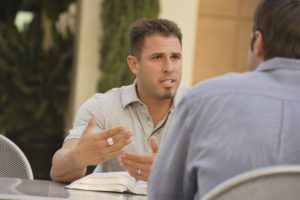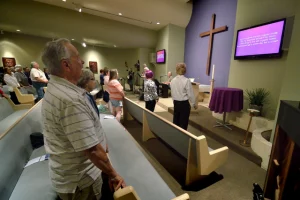Ministry for the Layman
Correcting a Common Misconception
For most of my life, I believed that the word “ministry” was only defined by the spiritually elite among us who go to Bible College and seminary and get degrees and names on a piece of paper. When I attended the Baptist College of Florida, my idea of ministry was solely vocational. I came to understand something my freshman year of Bible college. Preparing for ministry wasn’t about getting paid and starting a career. Ministry is the activity of God’s work for every believer. I was taught how to be a missionary in everyday life, outside of being a “pastor.” I realized that ministry is not just for vocational leaders. It’s for every saint.
At its foundation, I had a misconception of the role of a pastor. I thought he did all the work of ministry. After all, isn’t that what he gets paid for? Our society reassures this thought process with the American system of vocation: you only do the work you get paid for. If I worked a maintenance job and was fixing the A/C at a store, and they asked me to go to the front and ring up customers, I’d be surprised at the question. I would say, “I don’t get paid for that.” 
But God’s economy and the role of the church is a bit different from our American system of vocation. Pastors and leaders haven’t always done a complete job explaining the role of church members and ministry for all the saints. Also, some lay members have bought into a lie in the American church today: we pay people to do the work of the ministry so we don’t have to. This has resulted in the inactivity of members for the work of ministry. In order for us to grasp what ministry looks like for the layman, we must first ask the question, “What is the role of the pastor?”
Equipping the What?
Let’s look at a familiar passage of scripture where Paul talks about the role of a pastor and the members, or “saints.” Ephesians 4:11-13 says,
“11 And he gave the apostles, the prophets, the evangelists, the shepherds and teachers, 12 to equip the saints for the work of ministry, for building up the body of Christ, 13 until we all attain to the unity of the faith and of the knowledge of the Son of God, to mature manhood, to the measure of the stature of the fullness of Christ.”
Question 1: Did God call pastors, teachers, evangelists to lead in the body of Christ? Yes, absolutely. But he called them for a purpose: that they would equip the saints for the work of ministry and build up the body of Christ. Based on this simple passage of scripture, I believe a pastor has two major roles: (1) to equip the saints for ministry and (2) to encourage the saints (building up the body).
Question 2: So, is the pastor supposed to do the work of ministry? The answer to that is yes. But not just because he is a pastor. It’s because he, also, is a “saint.” Other passages of scripture talk about the role of a pastor as it relates to the work of ministry. See Acts 20:28, 1 Timothy 3:1-16, 2 Timothy 4:2, Hebrews 13:17, and 1 Peter 5:1-14. However, there is a lot of overlap between the ministry of every saint and the ministry of a pastor, such as the “Ministry of Reconciliation” in 2 Cor. 5:16-20.
Some would object. Question 3: “Isn’t ‘saint’ talking about extra-spiritual and super-religious Christians?” No, my friends. The word “Saint” refers to every born-again believer who has been saved from their sin and in relationship with God. 1 Peter 2:9-10 says,
“9 But you are a chosen race, a royal priesthood, a holy nation, a people for his own possession, that you may proclaim the excellencies of him who called you out of darkness into his marvelous light. 10 Once you were not a people, but now you are God’s people; once you had not received mercy, but now you have received mercy.”
The reason we are called “saints” is not because of our righteous acts, but because of what Jesus did on our behalf. He died to make us a holy, set apart people. That is what the word “saint” means.
Pastors, Use Your People
“I’ll just do it myself,” is a common phrase we hear ourselves say, especially serving in a Replant or Revitalization. No matter what our misbelief is about church members, we think it would just be better if we did it on our own. But if we are called to equip the saints, this means we have to let go of some of our control and give others the opportunity to lead in a variety of ways.
 In the process, we may find out that there are some lay members who are gifted, skilled, and adequately able to do far more than we can. God has spiritually gifted each member in some type of way, and it’s our responsibility to help members engage with God’s work both in and outside of our churches.
In the process, we may find out that there are some lay members who are gifted, skilled, and adequately able to do far more than we can. God has spiritually gifted each member in some type of way, and it’s our responsibility to help members engage with God’s work both in and outside of our churches.
I am not a Replant pastor, and I’m not in a leadership position at my church right now, other than teaching a Connect Group. As an Associational Leader I work with the churches and pastors in our area. We have a Church Development Team at the Association. This team has gone through the Replant Training together, and none of the 5 members we have on the team are pastors. Instead, we have an engineer, and superintendent of a shipyard, a pastoral-intern, an artist, and a stay-at-home mother.
What does God require of those he uses for His glory? Skill-set? Ability? No, God desires to use those who make themselves available for His great kingdom work.
Let Go and Let Them Lead
While it may require some oversight at first, pastors should feel comfortable letting go and letting lay members lead in different areas. There are times where church leaders feel the need to wear every hat in the church, sit in on every committee, and have a voice in every church matter. This type of micromanaging is more harmful than you realize. It’s time to step back and allow others to manage different areas.
A Replant or Revitalization may not have the funds to hire someone who is a seminary-trained, ordained pastor. The usage of laity is essential. As church leaders, we need to recapture what it means to help members identify their spiritual gifts, and put them to work…which is a different blog for a different day. Use lay leaders in children’s ministry. Use lay leaders in youth ministry. Use lay leaders in worship ministry. Use lay leaders in missions and outreach. Use lay leaders as greeters, ushers, and partners in ministry.
Martin Robinson, former president of Formission College, once said, “A missionary church cannot rely on the professional ministry for the primary work of mission. The role of the laity is critical because it is the lay members of the church who have the greatest contact with those who are outside of the normal structures of church life. In such a situation the task of clergy is not so much to engage in mission themselves, as to support the laity in their mission.”

